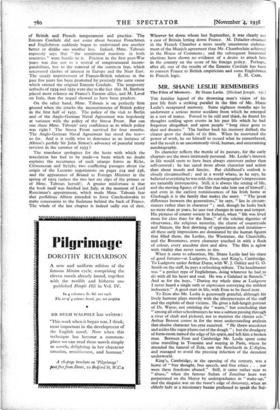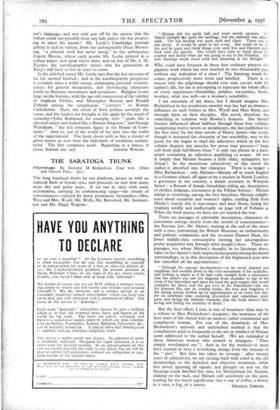MR. SHANE LESLIE REMEMBERS
The Film of Memory. By Shane Leslie. (Michael Joseph. xis.)
THE familiar legend of the drowning man's vision of his past life finds a striking parallel in the film of Mr. Shane Leslie's recaptured memory. Some eighteen months ago he underwent a serious motor accident from which he emerged in a sort of trance. Forced to lie still and think, he found his thoughts settling upon events in his past life which he had forgotten altogether; and upon people " long since gone to dust and dreams." The further back his memory drifted, the clearer grew the details of ifs film. When he recovered the power of work, he set himself to record what he remembered, and the result is an uncommonly vivid, human, and entertaining autobiography.
Its charaCter reflects the mettle of its pasture, for the early chapters are the more intimately personal. Mr. Leslie's interest in life would seem to have been always extrovert rather than self-centred ; he has cared more about characte:eand action than about moods and fancies. But childhood's outlook is closely circumscribed ; and in a world where, 'as he says, he believed everything he was told, the autobiographer's impressions are naturally introspective. Still, it is always the setting of life, and the moving figures of the film that take him out of himself; and even in the earliest reminiscences of his Irish home at Glaslough it is the family that makes the story. ' "The 'great difference between the generations," he says, " lies in circum- stances rather than in character " ; and, though he looks back no more than 5o years, he sees vast changes in taste and temper. His pictures of county society in Ireland, when "life was Jived more for class than for the State," of the soleilui dignities of observance, the religious austerity, the charm of countryside and Nature, the first dawning of appreciation and intuition— all these early impressions are dominated by the human figures that filled them, the Leslies, the Westrenas, the Churchills, and the Rossmores, every character touched in with a flush of colour, every anecdote alert and alive: The film is aglow with vitality that never seems to tire.
When it came to education, Mr.. Shane Leslie had his share of good fortune—at Ludgrove, Eton, and King's, Cambridge. To Ludgrove under Arthur Dunn, with W. J. Oakley and G. 0. Smith on the staff, he pays a refreshing tribute. The headmaster was "a perfect type of Englishman, doing whatever he had to do with all his heart and soul. He was a Galahad in flannels." And as for the boys, " During my whole time at Ludgrove I never heard a single oath or expression conveying the mildest indecency." A good start in life, with Eton to be faced next.
To Eton also Mr. Leslie is generously grateful, although his lively humour plays merrily with the idiosyncrasies of the staff and the exploits of their victims. He gives a full-length portrait of Dr. Warre, not omitting the " warts," but concluding that " among all other schoolmasters he was a salmon passing through a river of chub and pickerel, not to mention the slimier eels." Arthur Benson comes in for the most understanding analysis that elusive character has ever received. " He'thw anecdotes and asides like sugar plums out of the dough " ; but the drudgery of form-room turned the edge of his spirit, and left him a broken man. Between Eton and Cambridge Mr. Leslie spent some time travelling in Touraine and staying in Paris, where he attended the funeral -of Zola, saw the Bernhardt in L'Aiglon, and managed to avoid the pressing infection of the decadent underworld.
King's, Cambridge, at the opening .of the century, was a hOme of " free thought, free speech, and free' ethics . . . nor were these freedoms abused." Still, it came rather near to " abuse," when the famous Sultan of Zanzibar hoax was perpetrated on the Mayor by undergraduates in " make-up," and the disguise was on the razor's edge of discovery, when an eldorlY lady at a Missionary baidar professed to speak the
tan's language, and was only put off by the excuse that the Sultan could not possibly meet any lady unless she was propos- ing to enter his harem ! Mr. Leslie's Cambridge portrait gallery is rich in variety, from the unforgettable Oscar Brown- ing, " a colossal snob but never smug," to the unforgotten Rupert Brooke, whose early poems Mr. Leslie printed in a college paper, and upon whose fame, 'and on that of Mr. J. M. Keynes, the autobiographer opines that his generation at King's will have to live in years to come.
In his sick-bed trance Mr. Leslie, says that the last ten years of his life seemed blurred ; and as his autobiography progresses it certainly takes a wider sweep, exchanging personal reminis- cences for general discussions, and introducing characters partly to illustrate movements and revulsions. Religion looms large on the horizon, with the age-old controversy of the validity of Anglican Orders, and Monsignor Benson and Ronald. Firbank among the conspicuous " converts " to Roman Catholicisin. - Next, the cloud of Irish politics envelops the scene, and the leaders are brought to life again by the wand of wizardry-:-John Redmond, for example, ,who " spoke like a classical orator and looked like a Roman Emperor," and George Wyndham, " the last romantic figure in the House of Com- mons." And so, out of the world of the -past into the realm of the supernatural. The book closes with as fine a cluster of ghost-stories as ever bore the hall-mark of credulous authen- ticity. The film completes itself. Beginning in a trance, it











































 Previous page
Previous page